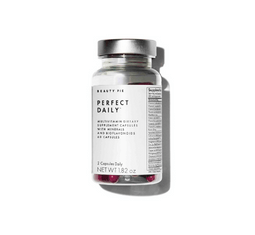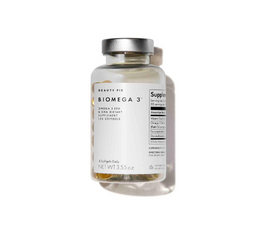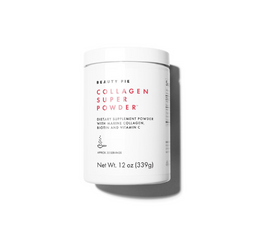What’s Better for Your Skin, Topicals or Supplements? A Derm Weighs In On the Debate
My curiosity sparked one key question: What's better for your skin—supplements or topical products? If I was going to venture into this new wellness territory, I wanted to be sure it would be worth my efforts. So, I asked New York City-based, board certified dermatologist Hadley King, MD, FAAD for the skinny.
The short answer? Both topical and supplements can help, in different ways. “In my opinion, the ideal recipe is to combine a healthy lifestyle with science-backed topicals,” Dr. King says. “I recommend a predominantly plant-based diet rich in antioxidants, and supplements can be used to address any deficiencies.”
Below, she breaks down the benefits of each category, and weighs in on the ingredients in Beauty Pie's new line of skin supplements—because if I'm being frank again, seeing their modern packaging and hearing about their benefits are what piqued my interest in supplements in the first place.
For the uninitiated, Beauty Pie cuts out the middleman to bring its members luxury beauty products, makeup, body care, fragrances, and hair care at major savings (think, up to 75 percent off). And when you’re shopping for supplements as a member, you’ll only pay a fraction of what the superior-quality formulations (they were meticulously researched by functional hormone nutritionist Kay Ali mBANT, rCNHC, and use bioavailable ingredients at peak potency for max benefit) would cost at typical retail prices, so you don’t have to spend a fortune on a daily routine.
Keep reading for more intel on the benefits of skin supplements vs. topicals.
Shop Skin-Supportive Supplements
Benefits of topicals
When it comes to glowy, healthy skin, Dr. King has one overarching piece of advice: Maintain a healthy skin barrier. A damaged skin barrier can lead to premature signs of aging, whereas a healthy one is better equipped to defend your complexion from environmental stressors. And since your skin barrier is the outermost layer of your dermis, one of the easiest ways to support it is from the outside, in—via topical products.
Some of Dr. King's favorite skin-barrier strengthening tips: Practicing sun protection (SPF is your friend, y'all), gently exfoliating, and seeking out anti-aging products packed with actives such as retinoids and vitamin C as well as ingredients that nourish the skin barrier, like niacinamide and ceramides.
Benefits of skin supplements
On the flip side, one of the main reasons Dr. King recommends an inside-out approach to beauty is because the internal health of the body is often reflected on the skin. "I very much believe that...a holistic approach is necessary to optimize the health and functioning of the skin, the body, and the mind," she says. "A healthy diet rich in antioxidants, lean proteins, and healthy fats is critically important, as is exercise, sleep, stress management, and not smoking."
To start, she recommends adopting an anti-inflammatory diet, and then working with a doctor to identify any gaps (for example, getting your daily dose of vitamin D, which can be difficult to get enough of from food alone) that could be filled by supplements. "None of us eats a perfectly healthy and well-rounded diet every day, and even when we do, we may not absorb all of the nutrients, particularly as we age," Dr. King says. "It's best to discuss a supplement regimen with your doctor, who may decide to test your blood levels to assess for deficiencies before you start the new regimen."
A few skin supplements to try
I already have my topical skin-care routine on lock, so I decided I was ready to dive into the world of skin supplements. Dr. King's first pro tip? Multivitamins typically have many skin-supporting ingredients built into the formulation. Who knew my multivitamin habit was already supporting my skin!?
Beauty Pie’s Perfect Daily multivitamin includes vitamins A, E, and zinc (plus 19 additional nutrients), which Dr. King says play significant roles in skin health, maintenance, and skin’s immune function. Dr. King also notes that Omega-3s and healthy fats support the skin’s barrier from the inside, so I grabbed a bottle of Beauty Pie's BiOmega-3, too.
To double down on my vitamin D intake (since I've taken tests that show I'm deficient), I tapped Beauty Pie's Like Sun soft gels that are packed with vitamin D and K2—and are formulated to be the equivalent of letting my skin soak up the sun IRL, even when I've been sitting on Zoom calls all day.
Speaking of sunshine, Dr. King notes that sun exposure (among other things) is a huge factor in decreasing collagen, which is one of the main components of healthy skin. Since pretty much everyone gets some level of sun exposure year-round, I decided to add collagen powder to my lineup based on a 2019 study that showed oral collagen helped improve skin elasticity, signs of aging, and hydration.
One goal of mine is to proactively support my skin’s elasticity and health, so each morning I put a scoop of Collagen Super Powder into my water bottle—with a generous lemon squeeze—and enjoy the sweet berry flavor while meeting my daily hydration intake. And now I'm officially a supplements person (and I didn't even have to break the bank to do it, since Beauty Pie’s entire supplement range costs members less than $87).
Want even more of an incentive to become a Beauty Pie member? Use code BEAUTYPIE10 for $10 off your first order when you sign up!
Top photo: Getty Images/Peathegee Inc and Beauty Pie
Loading More Posts...



